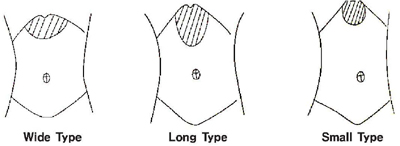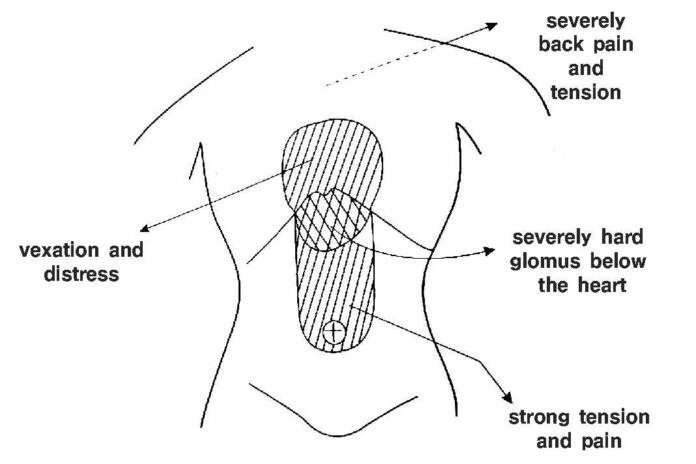Sign Symptoms and Herbs (1) Sign Symptom by abdominal diagnosis
By Jubong Kang, K.M.D.
The following sign symptoms of some herbs were excerpted from the book 『Medicine Signature(藥徵; Korean Version, Chung Hong Publisher in 2007)』 by Yoshimasu, Todo and the author’s ideas have been added through commentary and contents of some herb’s sign symptoms may differ from Yoshimasu, Todo’s, due to a different view point between him and the author.
Most quote provisions are from the English version of 『Shang Han Lun』 published by 『Paradigm Publications』 and provisions of 『Jin Gui Yao Lue』 were translated by the author from the original Chinese text to English.
One or two provisions were selected in every sentence, but this is not enough to completely understand every aspect of sign symptoms, but helps one to underlying concepts. If any student wants to know the whole process of making the sign symptoms, then I highly recommend reading the book 『Medicine Signature(藥徵)』 written by Yoshmasu, Todo.
1) Hard Glomus below the Heart (心下痞硬)
-Herbs: Huangqin (黃芩), Renshen (人蔘)
Ex. Formulas: Banxia Xie Xin Decoction (半夏瀉心湯), Lizhong Pill/ Rensen Decoction (理中丸/ 人蔘湯)
Sentence ① In greater yang disease, when the pulse is floating, stirred and rapid means heat, stirred means pain, (and rapid means vacuity; In 『Jin Gui Yao Lue((桂林古本)』, this parenthesized letters does not appear), there is headache, heat effusion, mild night sweating and yet aversion to cold, because the exterior has not yet resolved. But the physician uses precipitation and the movement and rapidity of the pulse changes to slowness. In the diaphragm there is pain that refuses pressure. With empty vacuity in the stomach, visiting qi stirs the diaphragm and there is shortness of breath, vexation and agitation and anguish in the heart. The yang qi falls inward and causes hardness below the heartⓐ, which means chest bind, ‘Da Xian Xiong Decoction’ governs. If no chest bind, only sweat issuing from the head – and without sweating kesewhere – that stops at the neck and urination is inhibited, there will be generalized yellowing(『Shang Han Lun』 Line 134, p.215, Paradigm Publications Version). (Wuling Powder governsⓑ(In 『Gui Lin Gu Ben』 this letters are written, in Song Version not written).
Commentary ① In this sentence, the reason for hard glomus below the heart to be palpated is because of fallen yang qi.
In the beginning stage of on exterior pattern, exterior pathogenic factors would invade more deeply into the body following the greater yang channel portion. And inner normal qi constantly pushes out exterior pathogenic factors to expel it away. Therefore two types of qi are in a confrontation at the superficial level. Floating pulse confirms the confrontation is at the superficial level of our body.

◁ Abnormal Diagnosis of Da Xian Xiong Decoction-Dahuang(大黃), Mangxiao(芒硝), Gamsui(甘遂).
At this time, a purgative formula was given through misdiagnosis and the inner body became vacuous. This allowed the exterior pathogenic factor to penetrate deeper into the body. Thus suppressing the normal qi. The injured normal qi from the wrong prescription became weakened and regressed to the inner region, where it moved to below the heart to be formed.
This is the fallen yang qi expressed in the sentence of this paragraph; The exterior pathogenic qi and inner normal qi are in confrontation with each other causing a hard glomus below the heart.
Precipitation which has a property of expelling downward movement, that made the stomach to be empty allowed the evil exterior qi to invade the region around the diaphragm from the greater yang channel portion.
By three burner theory of 『Nei Jing』, nutritive qi and protective qi move into the chest from the upper portion of the stomach, from which the inner yang qi is spreading out to move around the body(Dahuang 大黃, Mangxiao 芒硝, Gamsui 甘遂).
Namely both the inner yang qi which would have traveled through all channels from the chest, countered the invading exterior evil qi with pressing downward qi of a purgative formula at the portion around the diaphragm.
Normally both inner yang qi’s normal cycle would travel through the all channels from the chest but this time, it was encountered by the exterior evil qi with expelling downward qi from purgatives(=precipitation) at the region around the diaphragm.
The portion around the diaphragm is the region of the esophageal orifice of the stomach where normally inner qi begins to spread out from. But now, inner qi or inner yang qi is opposing where the two become bound to each other to form a glomus.
From the above contents, we are understand that the state of below the heart has a connection with other symptoms; therefore, a hard glomus below the heart spreads infection to other regions of the body, causing varied symptoms, since yang qi’s ability or strength care for other region is blocked.
For example, if a patient with insomnia, arthritis and atopic dermatitis, has a hard glomus below the heart then this patient’s different symptoms can be resolved by treating the sign symptom – hard glomus below the heart.
『Zhong Jing』 interprets the hard glomus below the heart in the sentences above by mentioning three kind of working qi of opposite directions in this provision.
The first direction is from exterior evil qi which moves downward, the second direction is from inner yang qi which moves upward and the third direction is from purgative’s qi which sends exterior evil qi downwards. He described it to us so that we can understand the dynamics in the region of below the heart.
Various treatment cases of syndromes related to this formula are recorded in 『Huang Han Yi Xue (皇漢醫學)』 written by Yumoto Kuisin.
Related to contents above, the symptoms written in this provision are similar to the syndromes of moist pleurisy, pericarditis or endocarditis.
If then, in modern language, this would then translate into: after receiving a purgative as a treatment, muscles upholding the heart around the diaphragm became intensely contracted because of severe inflammation and swelling of the tissues surrounding the heart.
Chest bind (結胸) in above provision is describing both a dramatic case and symptoms in other cases common disease. The process of forming into a hard glomus does not differ from the case of a chest bind.

































